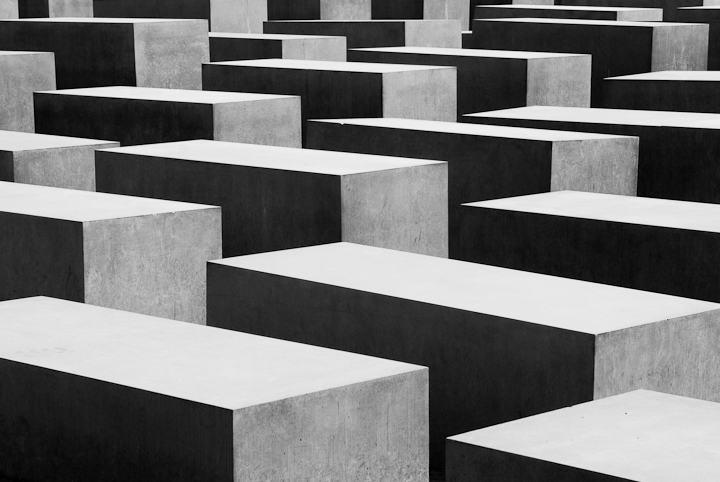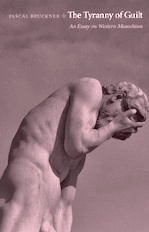
The Tyranny of Guilt: An Essay on Western Masochism
by Pascal Bruckner (Translated by Steven Rendall)
–Reviewed by Saskia Vogel
 Each of us in the West may well have a reason to carry around a guilty conscience, considering our history of colonialism, slavery, and genocide. But are we taking this guilt too far? Pascal Bruckner thinks so.
Each of us in the West may well have a reason to carry around a guilty conscience, considering our history of colonialism, slavery, and genocide. But are we taking this guilt too far? Pascal Bruckner thinks so.
The Tyranny of Guilt examines how the Western guilt complex may in fact be a major hurdle in fighting today’s atrocities. Bruckner, a prize-winning French essayist and novelist, tackles the subject mostly from the French or European perspective and says that unending guilt is in fact vain and ineffective. The West wallows more than it repays debts, makes amends, or fully understands its role in the world. And in the case of France, Bruckner argues, guilt is also a symptom of the West’s dwindling importance relative to increasingly dynamic “Indian, Chinese, Brazilian, Arab, and Hispanic” cultures.
Western Democracies are populated, as Bruckner memorably puts it, by “self-flagellants” whose masochistic expressions of guilt border on the “suicidal.” He cites as examples the response to the July 7, 2005 bombings of the London transport system. Le Parisien’s headline read, “Al-Qaeda Punishes London.” Then-Mayor of London Ken Livingstone’s responded, “The suicide attacks would probably not have happened had Western powers left Arab nations free to decide their own affairs after World War I.” As with the European response to 9/11, which Bruckner summarizes, there was sympathy for the victims, but the attacks themselves – well, we had it coming. Bruckner’s shows that public discourse in the West is rife with self-hatred and self-blame, which he argues is a threat to clear thinking. How can Western nations assess current affairs if the West by default positions itself as sinners begging for punishment?
Bruckner widens his view from headlines to filmmakers, saints, thinkers, and world leaders, weaving together Western narratives in an eerily effective way. He quotes, for example, Jean Baudrillard giving an “utterly religious justification of the vengeance” of the terrorists against the US in 9/11. Roberto Benigni’s Holocaust film “Life is Beautiful”, which shows a sanitized version of Auschwitz, indicates that Europe is like a murderer trying to “erase the evidence of his crime.” Bruckner reaches back to Immanuel Kant and St. Thomas and forward through Jacques Derrida and President George W. Bush to support his argument, and shows how we choose to narrate ourselves. The power of storytelling is undeniable – is a story of guilt and punishment the most responsible way to chronicle our history?
This is just the tip of Bruckner’s text. Bruckner goes on to discuss the “blunders of the [West’s] disproportionate” focus on Israel, democracy as a religion, and tensions and dependence between the US and Europe. He concludes by setting out a task for the early 21st century: “Reconciling Europe with history and the United States with the world.” He suggests Europe must learn that battles are not won by “compromise” and “incantation” alone, and that the U.S. cannot continue “trying to do good for people no matter what they want.” Bruckner is optimistic about the power of Euro-American cooperation, feeling that in the past it has yielded “marvelous results.” Bruckner calls for extending such cooperation into this century.
Although The Tyranny of Guilt is spellbinding in its practically poetic repetition of key concepts, as political commentary it frequently amounts to argument ad nauseam. Bruckner writes, “There is no doubt that Europe has given birth to monsters, but at the same time it has given birth to theories that make it possible to understand and destroy these monsters.” And then again Europe “is a machine both for producing evil and containing it” – a concept he rephrases several more times. Bruckner also makes sweeping generalizations that beg for closer attention – that, for example, the U.S. was born “from a collective commitment to regard everything as possible,” whereas Europe “was born out of its weariness with sacrifice.” Still, The Tyranny of Guilt is a landmark exploration of the myopia that comes with Western guilt.
Excerpt: “On the whole, the Old World prefers guilt to responsibility: the former is easier to bear; we get on well with our guilty conscience. Our lazy despair does not incite us to fight injustice but rather to coexist with it. Despite our intransient superego, we delight in our tranquil impotence, we take up permanent residence in a peaceful hell.”
Further Reading: The Temptation of Innocence: Living in the Age of Entitlement by Pascal Bruckner and Guilt about the Past by Bernhard Schlink.
*Photo of Berlin’s Holocaust Memorial courtesy Vectrus. Homepage photo courtesy Andreas H. Lunde.




Send A Letter To the Editors